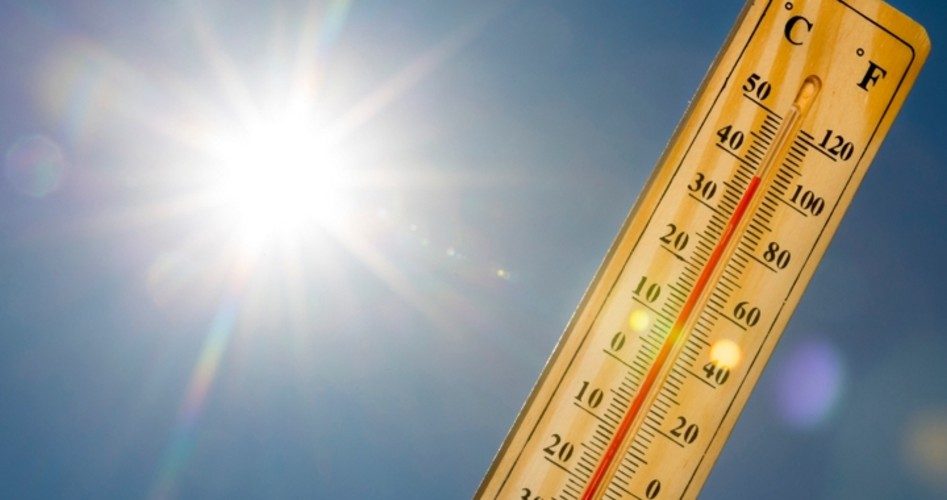
Climate hysterics, disappointed by the lack of apocalyptic rhetoric being spewed over the fact that it becomes warm in summer, are now suggesting that heatwaves be given names à la hurricanes and winter storms. Proponents believe that naming heatwaves will cause people to take them more seriously.
As the United Kingdom and much of Europe suffer through an unusually warm summer, some believe that the hysteria must be intensified in order to frighten people into acceptance of anthropogenic climate change.
Bob Ward, the policy and communications director for the Center for Climate Change Economics and Policy, suggested the change in a commentary published by the London School of Economics.
“A failure by the media to convey the severity of the health risks from heatwaves, which are becoming more frequent due to climate change, could undermine efforts to save lives this week as temperatures climb to dangerous levels,” Ward wrote.
In the U.K., Ward suggests that heatwaves should be named if, depending on location, temperatures for three or more consecutive days will be at or above 25ºC (77ºF) to 28ºC (82.4ºF). While it is true that the U.K. generally experiences cooler summers than most of the United States, 77-82ºF sounds just a little bit low to qualify as a heatwave. Won’t they run out of names?
Ward continues: “Based on the experience of the last three summers, during which more than 2500 people across England were killed by heatwave conditions, hundreds of vulnerable people could die across the country in the coming days.”
Public Health England estimated that the warm summer of 2018 caused 863 excess deaths in the United Kingdom. The number of deaths is considered “excess” if it is higher than the average expected number of deaths for a specific date. The deaths recorded are of “all-cause mortality,” not necessarily cases of heat stroke or other heat-related conditions.
So, the excess death numbers is a fairly reasonable assumption — just not a scientific one.
Ward isn’t the only one sounding the alarm on the danger of heatwaves in the U.K. The Royal College of Emergency Medicine (RCEM) and the Royal College of GPs (RCGP) are also warning that Britain’s National Health Service (NHS) is facing a “climate emergency” due to the unusually warm weather of the past few years.
“The Royal College of Emergency Medicine recognizes the climate emergency and the need for urgent action to mitigate against the increasing risks it brings to public health,” said Gordon Miles, the chief executive of the RCEM.
The chair of the RCGP, Helen Stokes-Lampard, agreed, saying the severity of recent heatwaves was becoming a “seasonal crisis to match winter pressures” in severity.
It’s a funny thing that Professor Stokes-Lampard mentioned winter. Last year, official government figures measuring the amount of excess winter deaths throughout the U.K. show that, last winter alone, more than 50,000 people died because of cold conditions. Largely due to “green energy” mandates, fuel costs in Great Britain have skyrocketed, leaving approximately one in 10 families in “fuel poverty”in the nation.
Let me check my math. Yes, 50,000 excess deaths caused by cold is higher than 863 excess deaths caused by heat. Shouldn’t the 50,000 deaths be the higher priority?
But a large number of winter deaths caused by people reluctant to turn the furnace on doesn’t fit the climate-change narrative, does it?
The climate-change movement is all about creating fear. Excess deaths in the summer can be used to stoke fear of man-made global warming; excess deaths due to winter cold cannot.
Of course, heatwaves can be dangerous to vulnerable people such as the elderly and infants. If naming them will save some people, then they should go for it. But if they then turn around and ignore the vastly more dangerous cold weather, then it’s not about saving people. It’s about propaganda.
And that’s just dishonest.
Using extreme weather to fuel climate fear is a standard tactic for climate hysterics. When weather events such as heatwaves occur, it’s considered perfectly acceptable to scream “climate change is literally killing us!” However, when dangerous weather that doesn’t fit the narrative is observed, apparently no hysterics are necessary.
Image: Cylonphoto via iStock / Getty Images Plus
James Murphy is a freelance journalist who writes on a variety of subjects with a primary focus on the ongoing climate change hoax and cultural issues. He can be reached at [email protected].



